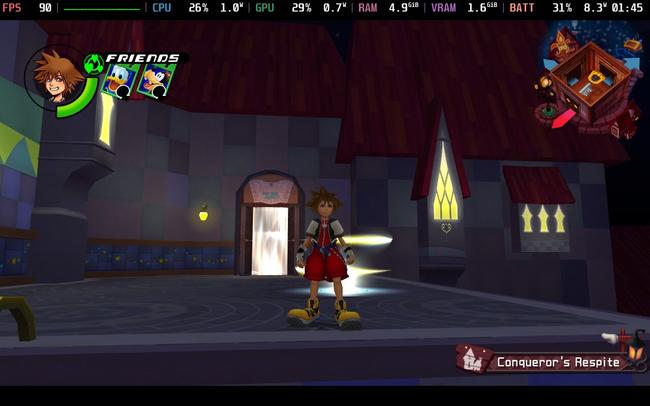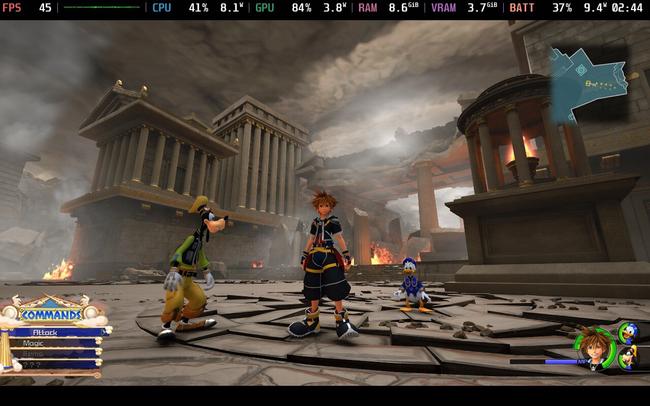It feels kind of wild that it’s been over 3 years since I first laid eyes on it Kingdom Hearts IIIGreat PC port, and a lot has changed for the PC market in that time. Most importantly – Steam Deck has popularized handheld gaming and expanded the need for companies to at least test their games for Linux compatibility with Proton. Since any modern PC will be able to run any of the PS2 or 3DS Kingdom Hearts games, I thought it made much more sense to focus on how these updated ports are handled in the Steam Deck.
Advertising. Keep scrolling for more
Part of that is because the older, Epic Games Store versions of these games had notoriously mixed results running on a Steam deck, even discounting the hoops it had to jump through to get them onto the device. Thankfully, Square Enix hired a third party to help them iron out any major issues before they finally released the games on Steam. Results? Barring a few minor remaining issues, these are likely my new favorite ways to play games.

First things first; HD 1.5 + 2.5. These were the real problem children when it came to Steam Deck compatibility in the past, with an odd load of compatibility even on Windows-based PCs. In the interest of time – and in search of a specific potential problem – I chose to start Re: Chain of Memories through the collection. Immediately the FMV cutscene at the beginning of the game played without any problems and without requiring any changes. Performance once properly in-game was also flawless, with over 5 hours of battery life at your disposal on an OLED Deck while running the game at a 90 FPS target. If you’ve ever tried running games on a Steam Deck before these new ports, you’ll understand exactly how big a deal this is.
The same can be said for Kingdom Hearts and Kingdom Hearts II, although it’s worth noting that in each of these games you may encounter cutscenes that run at 30 FPS regardless of your settings. Additionally, despite there being an option to set the game’s resolution to 800p, none of the games I tested could actually use that full-screen real estate and will simply run internally at 720p without stretching the output to to fit full screen. This is better than the alternative, but it’s at least a bit of a shame that 16:10 support wasn’t added alongside the more important Steam Deck compatibility fixes.

This is where I entered Kingdom Hearts III and, as expected, players will have to make sacrifices depending on their preferred gaming experience when it comes to their chosen graphics settings and internal resolution. I noted that the lack of fine control over the port’s internal resolution was probably one of my main complaints back in the day, and that goes double for Steam Deck performance – where 60 FPS would probably be just as achievable at an 85% resolution scale what is with a 75%. To be clear; the game still runs pretty well, regardless.
On the medium preset and at a resolution scale of 100%, players can expect a near-locked 45 FPS – just saying “near-locked” due to the nature of the gameplay of the pre-released games on the Deck introducing the issue of shader compilation stutters. At a resolution scale of 75%, you’ll be good for 60 FPS – and for both options I’d say expect around 3 hours of playtime on an OLED Deck. Wait more than 2 hours for an original model; and of course you can increase your battery life by playing at 30 FPS, although I personally would never do that. Our time was limited before the embargo and as such I wasn’t able to test it as much as I would have liked, but I would assume a similar if not slightly better performance in 0.2: Birth by Sleep – A Fragmentary Passage.

Advertising. Keep scrolling for more
One issue that most players will likely not care about is that currently Kingdom Hearts III does not allow the player to enable HDR on the OLED Deck. Personally, I’ve found the HDR implementation for the game to be pretty good in the past, so hopefully this issue can be fixed without too much delay after launch; I assume you will. Other than that, though, I don’t really have any complaints about the state of games on the Steam Deck.
It may have taken us a long, long time to get here, but there’s finally a solution at hand to play the entire Kingdom Hearts series that doesn’t require you to be connected to an internet connection. For many RPG fans, this is probably a dream come true – and I can’t blame them. Kingdom Hearts is worth playing on Steam Deck; whether it might be your first time experiencing Sora’s journey, or your tenth.
The code was provided to RPG Site for the purposes of this coverage.
